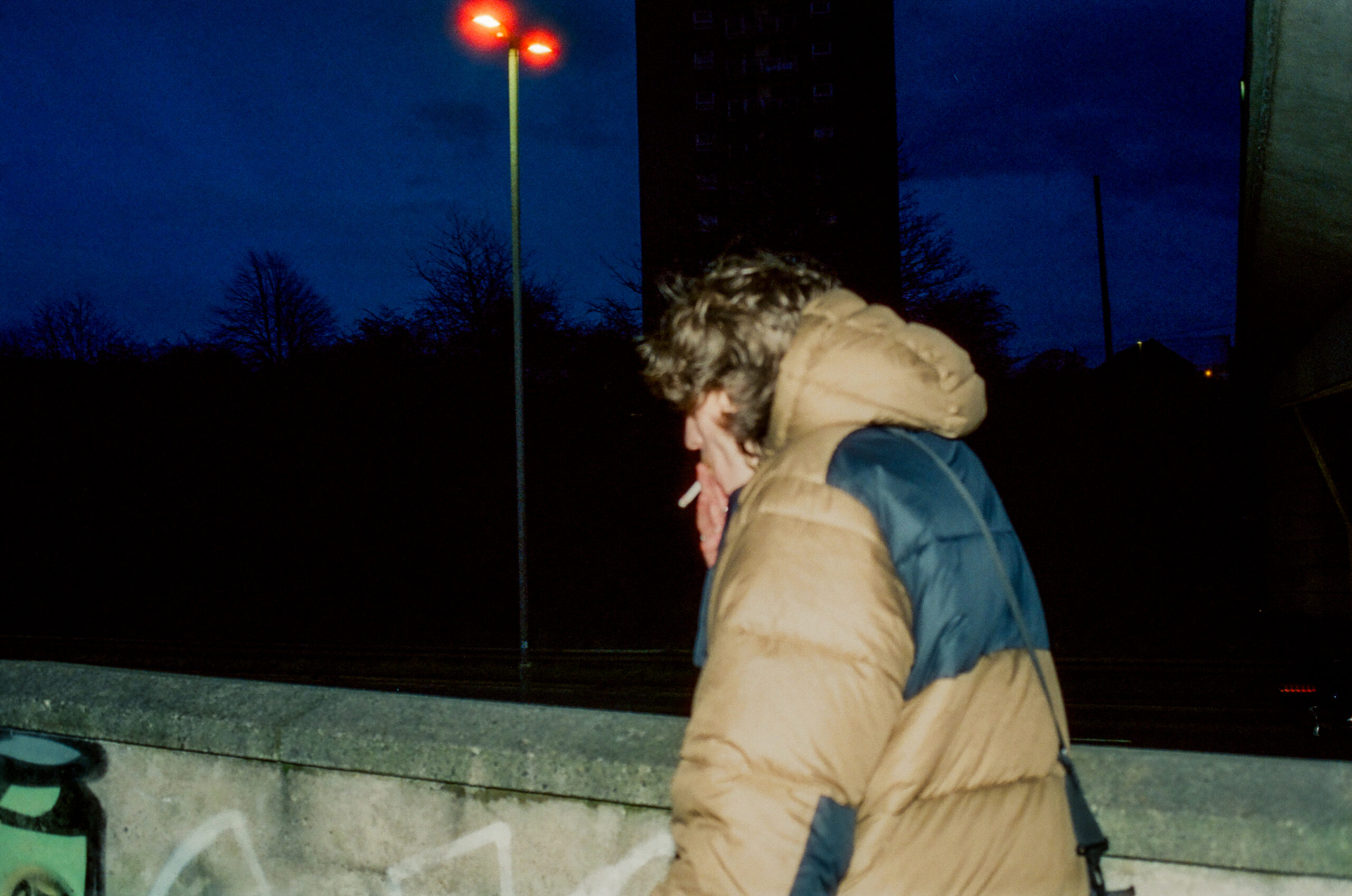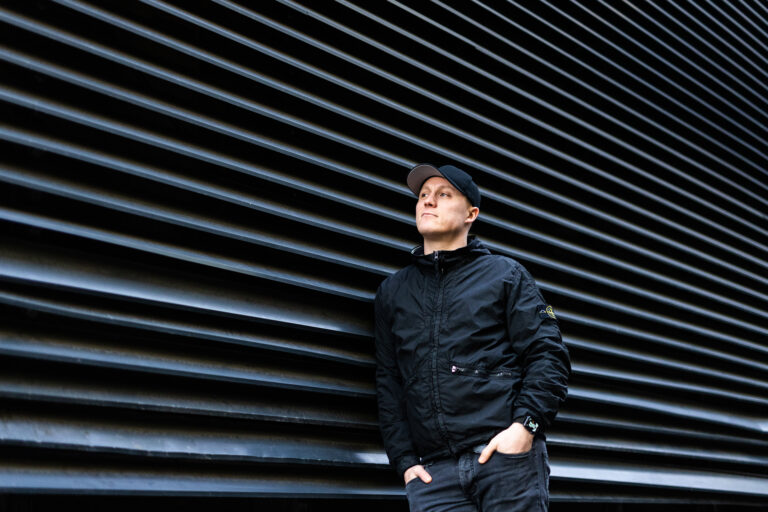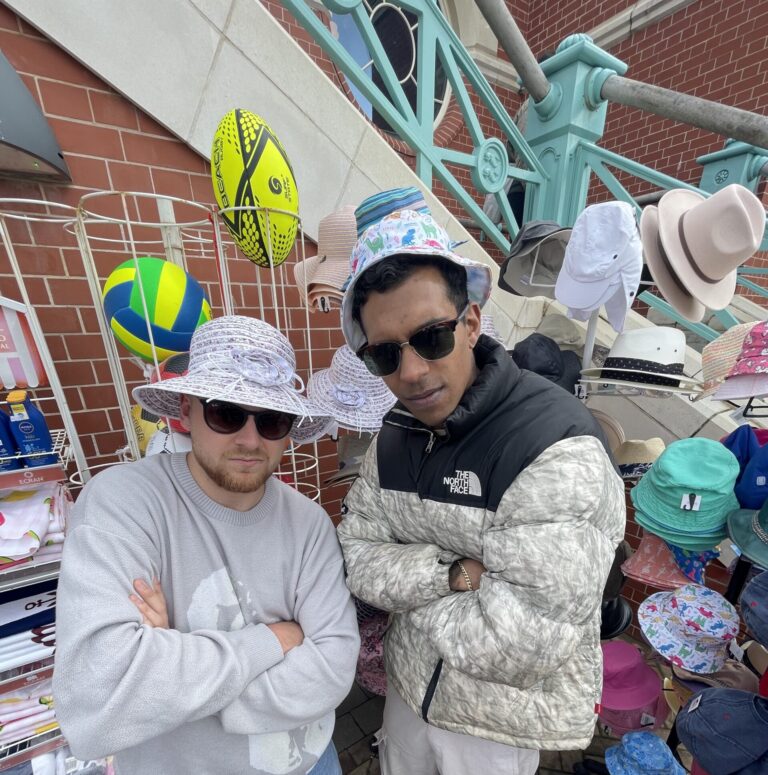Oscar Kenny, known by his moniker Bypass Music, is a rising star in the electronic music scene. With his debut EP, he has managed to create a unique blend of ambient textures and emotional depth that resonates with listeners on a personal level. Based in Leeds, Oscar has been honing his craft since his early teens, spending countless hours in his home studio. In this exclusive interview, we dive into his creative process, inspirations, and plans for the future.
What are you up to now?
I’m in the studio in my back garden here in Leeds. I’ve spent every evening here from the age of 13 to 20. It’s covered in equipment and a bit of a mess right now, but it’s my creative space.
What’s the setup like?
I’m using Logic with HS5 speakers. It’s a basic setup, really. I just have a standard Focusrite interface and a decent microphone. Nothing too fancy, though I wish I had some Apollo sound cards and some Yamahas though.
Is it important to have a space like this?
Yes, it’s very spiritual here. It feels natural to make music in this space. It’s one of the only rooms where I can fully be myself. Sometimes working in the studio feels like an extension of who I am.
What got you into music production?
I started making beats on GarageBand when I was like 10 and then that turned into Logic by the time I was 13. And then my dad is a writer and producer as well. So, we’ve always had the studio in the garden. When I got to 13 instead of going out with my friends, the first year of high school, I used to spend most of my evenings in the studio. Back then I was trying to do the whole Martin Garrix thing, you know, the super big room, dance-pop scene. I wasn’t trying to make anything original; I was just trying to emulate it.
Then when I was 14, I started engineering and producing for local rappers from Leeds. But I just spent a big, big portion of my teenage years doing that. But yeah, I am. I used to have something I can quite vividly remember. Actually, I used to obviously do all these sessions with rappers and it was a way of making money and it was never really a thing of pure passion. However, I can remember as soon as I was left in the studio by myself, I used to have this craving of I want to make some shit that gives me goosebumps or something I’m going to feel emotionally. And then that’s when I started doing the low-fi-esque garage thing that I feel like I’ve got going on at the moment. It was a way to make money rather than a passion project, but it was during these sessions that I began to seek that feeling of creating something that gives you goosebumps.
Did you feel misdirected starting off?
Absolutely. I think it was difficult because you know, my whole purpose for making music is to get goosebumps and I only really get that from emotional music and then when you’re in a room of 5 to 6 rappers and you know, you’ve got to make the hardest drill beat that they’ve ever heard. I feel like it put me in a position where I felt like I wasn’t sure where I was going to go. I felt slightly misunderstood when I was in sessions with other people. Hence why I spent most evenings out here by myself for a lot of years just you know, after searching for that feeling of getting goosebumps just from music. Making beats for a group feels like a live performance. When COVID lockdown happened, I couldn’t do that anymore. That’s when I got really involved in my own music and sound, exploring it without anyone looking over my shoulder.
Did you enjoy making rap beats?
I feel like that whole time of working with rappers was interesting just because you know, when you’re in a room full of sometimes like 5 to 10 artists and you’re on the buttons and you’re the engineer. You got to kind of keep everybody engaged. And I found ways of doing that might be, I don’t know, manipulating the beat at certain points, manipulating the voice, punch lines and stuff. I found it quite endearing because every single time you’ve almost slightly felt like a live performance in a strange way because if you’ve got the song there, the vocal is mixed, instrument was all sitting nice and then I used to take it upon myself to try and gas everybody up that was in the room. It was an interesting time.
Tell us about Bypass Music.
Bypass Music is my first EP, a 6-track project that took about a year and a half to produce. It feels like a coming-of-age EP, reflecting four years of feelings, fears, and insecurities. The first song I wrote for it, ‘Strangers’, is about a panic attack and feeling awkward as a teenager. It captures that phase of growing up and becoming an adult.
I just started writing my own songs in the studio and because I had nobody around me to influence what I was working on. I think it was just like originally me for the first time. And then when I realised, I could do that. I just became hellbent on making a project that felt like me, but I feel like that took a long time to do the run around I’ve made in the projects I’ve made. From instrumental dance projects to full on folk singer-songwriter projects. And then I think when I landed on Bypass Music I think that was the first time when I thought, you know, I actually am ready to put some music out there. Cause I’m, as you can probably tell, I’m not a very social person and I’m quite an anxious individual. And so, the thought of putting music in the world has always felt, you know, like it was going to be something quite difficult. But I think because I’m so proud of the music now because I do genuinely believe it is a true reflection of me. It’s not actually as difficult as I thought it was going to be.
How did you shape your sound?
I’m inspired by bedroom pop artists like Clairo, who make understated indie music. I’m quite fascinated by the concept of bedroom pop music. These records, while great pop songs, are created in a very understated and lo-fi manner because many of these kids genuinely make them in their bedrooms. This aesthetic has subtly influenced my dance production, as I love the idea of bedroom garage music.
Unlike those who enjoy raves and clubs, I’m more of a listener. I prefer to sit by myself and dance away. This preference for solitude reflects in my music, making it quite emotional. I’m always searching for that ‘goosebumps’ feeling, where a song feels so right that it almost makes you want to cry, even if it’s not sad. I’m addicted to that feeling and it drives me to the studio, sometimes even losing sleep over it. This passion is incredibly important to me.
Hearing Burial for the first time really captured that sound for me. My music is quite emotional. My main aim is always to try to give the listener goosebumps. It’s difficult to do but when you achieve it it’s a great feeling.
What songs have given you these goosebumps?
Prince’s ‘I Feel for You’ and The 1975’s ‘Robbers’ have overwhelmed me.
You seem to be more inspired by the live music scene rather than the electric music scene. Do you feel like an outsider in the scene?
For sure. I’m an indie artist making electronic music. The fundamentals are there, but if you create a garage beat over a song, it doesn’t necessarily make it a garage track. My projects dance around dance music and are more suited for introverted listeners rather than for the club.
What’s your songwriting process like?
For Bypass Music, everything starts with ambience.
That’s very unusual for a producer. How did that happen?
I’m a big fan of Brian Eno and create a lot of ambient sounds using guitars with reverbs, doublers, and octave pedals. It’s about capturing textures and creating a space. I love trying to capture the environment I’m in when I make music.
So you produce, make beats, write songs. When did you start singing?
I started singing when I was about 13, writing lyrics and recording them. I’m quite impatient in the studio, and it often feels like a blur. I focus on the feeling of the music, listening to it until I hate it.
Who would be your ultimate collaboration?
I’d love to collaborate with George Daniel from The 1975. Also, Amber Bayne. Their music combines electronic and pop elements with a leftfield, abstract perspective, which I love.
Where did you get the name Bypass from?
It’s a mix of two things. My best mate lives in a village near Manchester, and we spent a lot of time on the bypass listening to music and writing songs. I also live next to a bypass and would record the ambient sounds. Inspired by Brian Eno’s “Music for Airports”, I wanted to create “Music for the Bypass”.
Would you perform as a band in the future?
Yeah, for sure. That’s the plan. I don’t see myself as a singular producer or DJ like Fred Again. I want to feel more like a shoegaze band.
What’s on the horizon for Bypass?
The rest of the songs from the EP will be released soon. I’m working on a lot of music, ranging from singer-songwriter to grunge sounds. I like the idea of reinventing myself for each project, much like Bowie and Prince did. Each project is an opportunity to create a cohesive space, rather than just a song.


